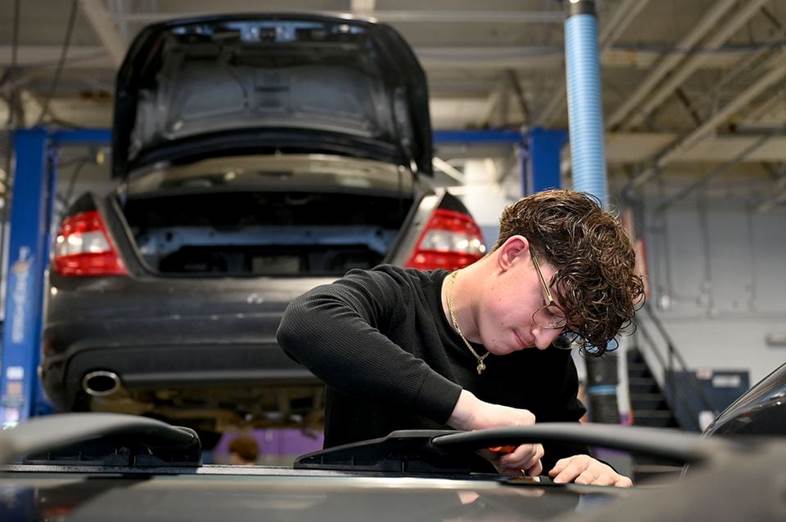Friends of Vocational Technical & Agricultural Education,
In the event you did not see this in today’s Boston Globe, below are three letters sent to the editorial board
David
LETTERS
Lottery admissions would leave many voc-tech hopefuls in the cold
Updated February 15, 2024, 2:30 a.m.
5 Freshman Bryce Wheeler of Grafton worked on the roof of a car in the automotive technology shop at Blackstone Valley Regional Vocational Technical High School in Upton. KEN MCGAGH FOR THE BOSTON GLOBE
Freshman Bryce Wheeler of Grafton worked on the roof of a car in the automotive technology shop at Blackstone Valley Regional Vocational Technical High School in Upton. KEN MCGAGH FOR THE BOSTON GLOBE
Safety and good attendance are essential to vocational education
The answer to increasing enrollment at vocational schools is funding for more seats. A lottery system that denies basic admissions criteria is a notion untethered to the reality of these settings (“Vocational-technical school admissions should be based on lottery,” Opinion, Feb. 5). Why? Because safety and attendance are of paramount importance.
A shop setting is an open-ended social environment lacking the structure of a traditional classroom with desks lined up. Such environments require a basic ability to attend to tasks absent issues related to impulse control or disruptive behavior. The equipment is dangerous. There is an art to running a well-organized shop setting. Instructors must be able to turn their backs on students while assisting others. In so doing, they must know that students will not be a harm to themselves or others.
Moreover, because vocational schools alternate academic and vocational instruction, a solid attendance record is crucial. One day lost in these settings is, in effect, like two days lost in an all-academic setting.
Vocational schools already present opportunities for a diverse student body, including those with special learning needs. But applicants must evince a certain “pre-vocational” skill level that lends itself to safety and success in these unique environments.
Any lottery system that fails to take into account basic behavioral criteria does a disservice not only to students but also to the primary mission of these most important public assets.
Dick Lee
Jamestown, R.I.
The writer was director of special education (now retired) with the Minuteman Regional Vocational Technical School District.
Work to find a middle ground of selective criteria and a lottery
In “Vocational-technical school admissions should be based on lottery,” Gladys Vega and Renee Ledbetter, leaders in the Vocational Education Justice Coalition, make a persuasive case for having admission decisions made solely by lottery in order to address discriminatory policies. Vega and Ledbetter also point out that the state Board of Education and certain schools are working to find a middle ground between selective admissions criteria and lottery-based admissions.
We cannot ignore the voice of the eighth-grader who, upon expressing an interest in a voc-tech education, is challenged to improve his or her performance as a requirement of admission in order to earn a spot. Nor should we overlook the applicant who is deeply interested in a particular career path and has already made an investment in time and focus but is barred by sheer luck of the draw.
Absolute solutions in education rarely work. A lottery alone is not necessarily fair. Voc-tech schools need to find the right balance to select admissions in both a transparent and equitable manner.
Steve Rothenberg
Hopkinton, N.H.
Lottery’s sledgehammer approach would be an insult to high achievers
Let me see if I have this right. Civil rights advocates are proposing to discriminate against vocational school applicants who study and work hard to earn good grades. The advocates’ solution is to replace academic achievement with blind luck.
This is an ill-conceived, sledgehammer approach that would deny admission to qualified applicants, no matter how hard they have worked. These applicants would include students from the same groups that the advocates are purporting to help through this proposal — students of color, low-income students, students with disabilities, and English learners.
Public schools have clearly documented issues with student achievement, particularly in large cities. Instead of posing the risk of downgrading the quality of the state’s vocational education program, civil rights advocates should work with education officials to upgrade students’ education leading up to vocational school. This would result in a stronger, more competitive program for all. Their lottery proposal would serve mainly as a disincentive to hard work.
David Wilber
Chatham
David J. Ferreira
MAVA Communications Coordinator
DavidFerreira



